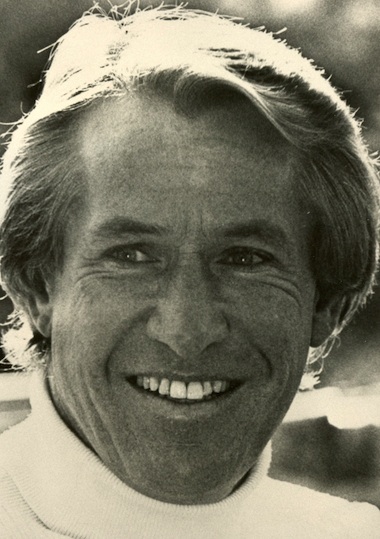
Bob Beattie: An Appreciation
By John Fry
Bold, dynamic, charismatic, Bob Beattie fueled much of what happened to competitive alpine skiing between 1960 and the end of the 20th Century. During those 40 years the U.S. Ski Team, Nastar, the World Cup, professional racing, and television coverage of the sport wheeled into the Beattie gas station where their tanks were filled with his super-octane energy.
Known to uncounted numbers of skiers, his obituaries now strewn across the Internet, Robert Prime Beattie, for the record, died on Easter Sunday, April 1, 2018 at the age of 85 at the home of his son Zeno, in Fruita, Colorado. What follows is an intensively researched, nuanced appraisal of when, where, and how he succeeded, by a journalist who knew, interviewed and interacted with him over 50 years. John Fry is indebted to Jack Beattie for providing little known facts about his brother, and ensuring the accuracy of some of this account.
Few figures in athletics have held sway over a sport in such diverse ways as did Bob Beattie. He became skiing’s combination in a single person of coach, commissioner, and sportscaster.
After he became national U.S. Ski Team head coach in the 1960s, he helped to create the World Cup of Alpine Skiing, insisting that the world’s best racers compete annually in America. He later caused the National Standard Race (Nastar) to explode from eight to more than a hundred ski areas. When he controlled head-to-head, dual-course professional racing in the 1970s, he made stars of dozens of skiers, giving them national and international visibility. For at least 20 years, on ABC sports and ESPN cable, he was television’s best known ski commentator. Without Beattie, much of skiing would be different from the sport we know today.
To read the full article, see the upcoming May-June issue of Skiing History magazine.

Comments
Mike Hundert adds this
The Coach has moved on. Bob Beattie peacefully passed away on Easter Sunday. The strident and consistent advocate for ski racers and their sport has gone silent. Legions of disciples, whose lives were forever changed by Beattie’s impacts on them and on sports, will carry his passion forward.
Beats was a heavyweight fighter. Even in recent days he grizzled over the administration of the US Ski Team, which he crafted in the 1960’s, and was outraged by the squandering of college ski racing to develop superior American competitors. He advocated the time is ripe for a new pro tour, “…although I’m not in shape to do it right now,” he told me in February, as if he soon will be ready to lead that revolution.
A revolutionary he was, captain of his own pirate ship. Beattie’s countless accomplishments include building the US Ski Team (while also coaching at University of Colorado), coaching the team to its first Olympic medals for men (Kidd and Huega in 1964). Beats collaborated in 1966 to design the World Cup, the “white circus,” a season-long competition among the greatest racers in the world. He left a contentious US Ski Team in 1968 and started his own ski racing tour, World Pro Skiing, focused on the more spectator friendly head-to-head format that Beattie was convinced would be more attractive on television, expanding the population of ski racing fans. Beattie’s organization, World Wide Ski Corporation, introduced millions of skiers over the years to racing through NASTAR, a recreational racing program run at ski areas nationwide.
The Godfather of American ski racing, Beattie was literally its Voice. For more than 40 years Beattie brought skiing into our homes via ABC and ESPN. His raspy commentary was as much part of the sport as the competition itself, his voice attached to classic moments of its history.
Beattie’s truest love was to see kids on skis. It was from those youthful experiences that he was convinced we would grow more and better skiers, and build superior character among them. In this regard, Beattie created a program in his adopted hometown of Aspen to provide opportunities for all kids in the region, regardless of social or economic circumstances, to get on skis. This dream has become a core value of the Aspen Valley Ski and Snowboard Club, where today over 2000 young people enjoy the experience of skiing each winter as a result of this Beattie creation.
Beattie was a champion of the racer. He coached young people to be their best by insisting and convincing them that they can. His winning attitude was contagious. His care for people was endless. These are the qualities that made Bob Beattie larger than life, a father-figure to scores of young people he coached and guided on and off the hill, who he prodded, poked, kicked in the butt, and mentored who will now pick up the mantle of his passion and dream for all of us and the sport of ski racing.
“You can rest when you’re dead,” Bob used to tell me when I worked for him. After 85 years of being a disruptor, making the world a better place for us, demonstrating that change lies within people’s passion, and constantly encouraging us to be better people – Bob Beattie can rest.
Bob Beattie is why I ski
As a young kid, I loved to watch Bob Beattie enthusiastic skiing broadcasts. I didn't have the opportunity to ski as a kid, but at age 30, I finally got my first chance to get on skis. 30 years later I have skied all over the world. Thanks Bob, for allowing this kid to dream big and live beyond his fingertips.
Add new comment